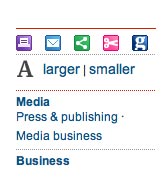Journalism.co.uk talks to reporters across the globe working at the collision of journalism and social media about how they see it changing their industry. This week, Damon Kiesow, Nashua Telegraph.

1. Who are you and what do you do?
I am the Managing Editor/Online at The Telegraph in Nashua, NH. I am responsible for the overall news presentation and strategy for our digital publications including NashuaTelegraph.com, NHPrimary.com, FeastNH.com and EncoreBuzz.com.
We have a staff of about 50 in the newsroom and nashuatelegraph.com was a finalist in two categories in this year’s Newspaper Association of America Digital Edge Awards.
2. Which web or mobile-based social media tools do you use on a daily basis and why?
On a typical day:
I use each for a variety of reasons. Delicious is my reigning favourite due to the huge filtering and early warning effect it provides. I follow about 78 people, mostly digital media professionals.
A few times per day I review their most recent bookmarks to keep up to date on what they are thinking about and what new tools and toys they have discovered.
I know many of them do the same and some of my ‘best’ ideas we have implemented at the paper have come from those bookmarks.
Twitter serves a similar purpose – and I am following many of the same people as on Delicious. But I like Twitter for the flexibility (IM, phone, PC, Web) and both the immediacy and asynchronous nature of the service.
It is just a great way to stay in touch with people without the burden of reading or responding to email or phone calls.
I use Ning mostly every day to visit sites like wiredjournalists.com, and we have created several Ning sites for the newspaper including Encorebuzz.ning.com.
I have been on LinkedIn for 5 – 6 years and it is still the best place to accumulate business contacts. I probably do not use it every day, but a few times a week I get requests to connect.
Facebook is one I use just due to the critical mass of people they have online. I check it every day and we do have a few small applications running on the service that feed out breaking news from the newspaper. Most of my time there is spent ignoring Zombie and Pirate invitations.
3. Of the thousands of social media tools available, could you single one out as having the most potential for news either as a publishing or a news gathering tool?
If I had to choose from just the tools I use regularly – I would pick Twitter. They have really focused on a core concept and seem very open to letting people expand on it.
It is too early to say if Twitter will be a huge hit for us as a newspaper but we pick up a few followers a week and the trend seems to be increasing.
I like the fact that we can use it both simply to push content (using twitterfeed.com) and as a two-way conversation with readers. We follow anyone who follows us and try to be responsive to questions or comments that come in via our Twitter friends.
In terms of other products – I think the most likely winners this year will be services like ustream.tv or qik.com that allow live streaming video from DV cameras and cell phones respectively.
This has huge potential both as a newsgathering tool and as a social media/self publishing phenomena. We are just starting to experiment with both of these services.
4. And the most overrated in your opinion?
At the moment I consider Facebook to be the most overrated. Things are beginning to change but it is still a walled garden for the most part.
I would not be comfortable investing a lot time or effort in using Facebook as a social media platform for the newspaper without some continued opening up of their API and clarification of their terms of service.





